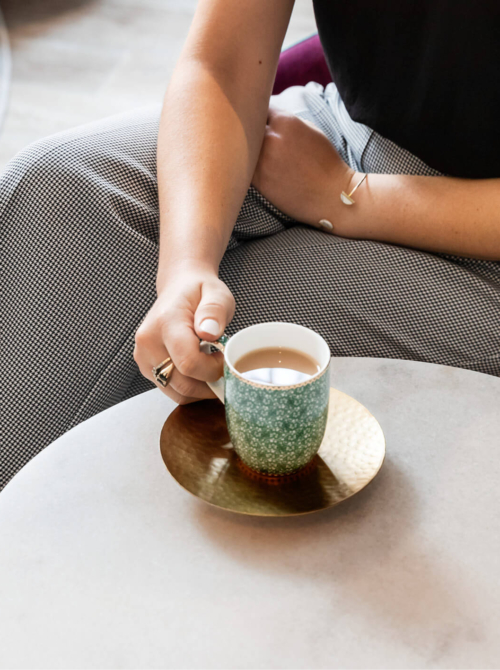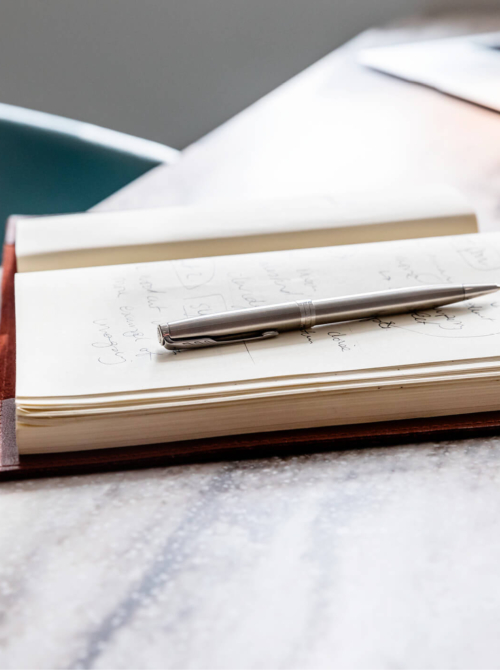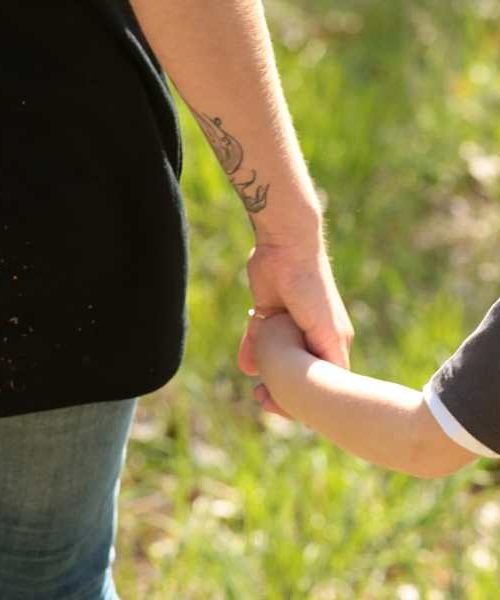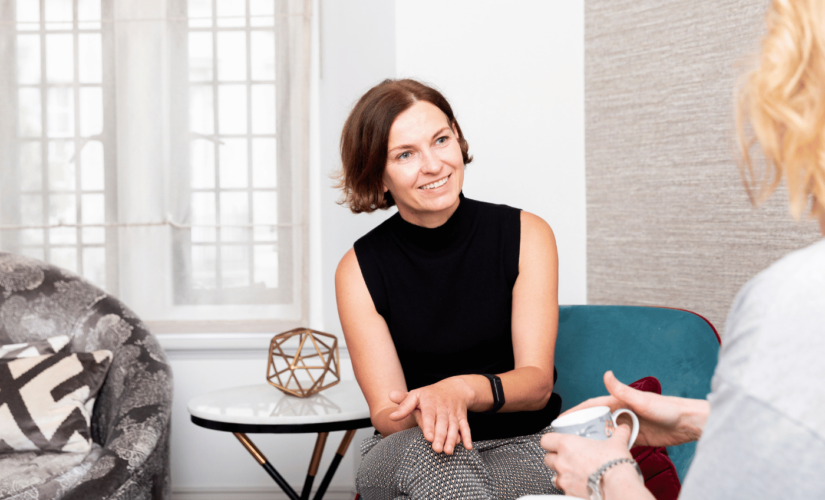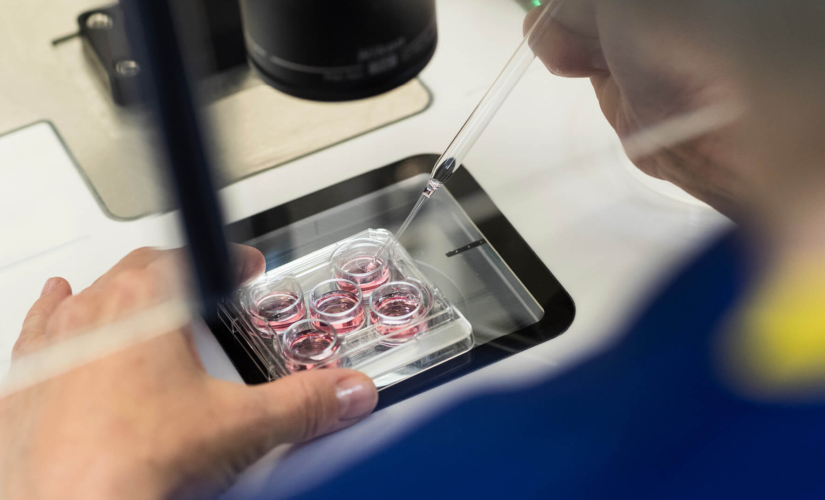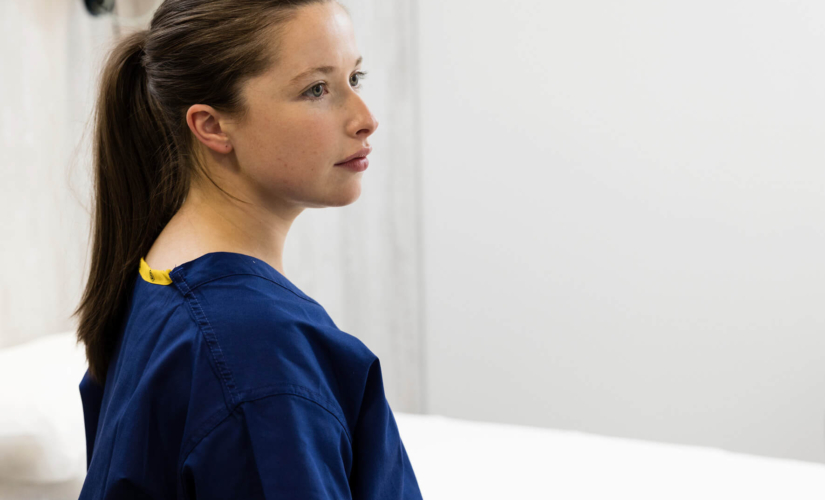Baby Loss Awareness Week stories: Emma and Simon’s experiences of loss and TFMR
Trigger warning: this story featured as part of Baby Loss Awareness Week 2021, and contains references to baby loss, termination for medical reasons and miscarriage.
Trigger warning: this story contains references to baby loss, termination for medical reasons and miscarriage.
Baby Loss Awareness Week 2021 (9-15th October) is a time for remembrance and reflection. This week, we’re sharing different experiences of baby loss in the hope that these stories will help families find solace, comfort and a sense of community. This is Emma and Simon’s story. They had to make an unthinkable decision for the sake of her older daughter when a 20-week scan revealed that their unborn child’s heart hadn’t formed properly. Emma explains how the experience has changed her irrevocably but helps her better understand and support parents-to-be on their IVF journeys in her role as Laboratory Manager at The Evewell, London. Emma, aka Emma The Embryologist, can be found on Instagram demystifying the IVF and embryology process.
“To be honest with you, I had always considered myself very lucky when it came to parenthood. At work, I support families experiencing fertility problems – so when my husband Simon and I quickly conceived our first child, we were delighted.
Betsy was born after an uncomplicated pregnancy, and life was great. A few years later, we felt ready for a second child. Again, we were delighted to conceive very quickly – I was 36 at the time, so I was prepared for things to take a little longer, but we were really lucky.
I wasn’t too worried about my scans, but decided to have a Harmony test and my early scans done on Harley Street to reduce the burden on the NHS.
12 weeks came around, and we were reassured when all the results came back as perfect. And we were very excited to find out that our little one was another girl, a sister for Betsy, who was then two and a half.
This time around, the pregnancy was tougher – I had terrible sickness, and incredible tiredness – and the work days were a real uphill battle. But we were excited and grateful, and looking forward to becoming a bigger family.
Soon enough it was time for my 20-week scan. Even though my mum and sister are both midwives, and I knew it was possible, when I walked into that room I didn’t expect for a second that anything would be wrong. Then the sonographer said there was a problem with the baby’s heart; a hole, and that the blood wasn’t flowing as it should be on the left side.
I’m a scientist, so straight away I wanted more information and needed to know what it meant for her, but they couldn’t tell me until I saw a fetal medicine specialist the next day. I knew that a hole in the heart could be fixed – so I kept calm – but then the fetal medicine specialist couldn’t tell me more either until more tests could be performed.
We were referred to the specialist fetal medicine unit at St George’s hospital, and had to wait 6 days for that appointment. They were the worst and longest of my life. I was 22 weeks pregnant, and I could feel her moving – I just couldn’t understand how there could be something so very wrong.
Then I went to St Georges for more tests and scans. They scanned me for 45 minutes without saying anything.
Afterwards, the consultant was kind, but the facts weren’t.
She explained how our baby’s heart hadn’t grown as it should; that the aorta hadn’t formed. Played out all these scenarios, that our little girl might not survive the pregnancy, or the stress of birth. That if she did, she would be rushed straight into NICU. That she would need open-heart surgery straight away… and multiple further serious surgeries if she survived and grew.
The consultant spoke about all the possibilities for about 20 minutes. Then gently explained, if she survived all of that, that she might be able to go to school.
I realised then that I was dealing with a child who probably would be stillborn. That if she was born, that she’d have to survive multiple back-to-back surgeries. That she would be so disabled that even if she lived through infancy, she would never be able to be a normal child, with a normal life. She was my child, and like any mother I just wanted to keep her safe – there was only one way I could be sure she would feel no pain.
I also thought of Betsy. My mind was crystal clear – we had a responsibility to the child we already had, too.
We had to consider how growing up with a terminally ill sibling would affect Betsy. How her life would change as we loved and looked after a second child who would be so fragile, who would need so much care.
How she would love a little sister so much – and how it would break her heart to experience grief and loss so acutely and so young.
I knew there was no choice. Whatever we might have wanted for ourselves, we had to do the kindest thing for both our little ones. It wasn’t what felt right by us, but we knew we had to let her go and be safe from everything the consultant had explained she would have to endure.
My husband was equally devastated, but we agreed. We would have to go through pain and grief whatever happened. But we knew that we didn’t want that for our unborn child, or for Betsy.
We came home, looked at our daughter, and knew medical termination was the right decision.
Only ten days after our 20-week scan, we went to Kingston Hospital.
I knew I’d have to deliver my baby, and that it would be on a labour ward. We were in a special room for families in our circumstances, but I could still hear the other women having their babies. The team who were supporting us were great, but the proximity and experience was heartbreaking.
When I welcomed Betsy to the world, I laboured in water, with just gas and air, no drugs. This time, I asked for them all. I was in enough pain, and I didn’t want them to be comparable experiences. It took seven hours, and little Dorothy died during the labour.
Afterwards, we spent the night together. Holding her. Loving her. Saying hello and goodbye. Then we had to leave, walk out through the new families who would be soon starting lives together.
To this day, that’s what stays with me. I had to go home without her. But I did get to go home and hug my first daughter – and that was my saving grace.
It all felt so, so, so unfair. I’ve spent my life helping others have babies – then this happened to me. I was absolutely devastated, but so very angry too. And people don’t talk about that. The anger that you feel. The sense of deep injustice. But it’s there, and it’s very hard to get past.
Afterwards, after the funeral, after I physically recovered, I went back to work. Looking back now, I probably shouldn’t have – it was only about 6 weeks after it all happened.
The first phone call I took was a woman who had just lost her baby. We talked about her loss for 45 minutes, I consoled her, did what we do for work. I eventually put the phone down, and was physically sick.
It was an incredibly dark time. I had support, a bereavement midwife, counselling… but my sister and husband held me together, even though they were breaking too. I threw myself into my job – it gave me purpose. I felt like it was all I was good at. Day-to-day, I felt like I was failing as a mum and a wife, but at least I was good at one thing. Work.
But given my job, I’m well aware that time starts to count as you pass your mid-thirties. So soon – too soon – I felt we needed to try again.
All I wanted was to replace the baby we’d lost. We conceived quickly, but lost the baby at eight weeks, with a difficult, complicated miscarriage that took six weeks and ended in surgery. I was so angry – it all felt like such a waste of time – I just wanted a baby so badly. I didn’t even really grieve. I just so desperately wanted to successfully carry another child.
The cycle of work and life went on, and after eight months, we conceived again. And again, we experienced a miscarriage.
Then, a year after Dorothy was born, I realised just how bad a place I was in, and knew we had to take a break.
We went on holiday, tried to relax, to be a normal family. I realised that Betsy might never have a sibling, and we needed to let go. It was like I got this clarity, and I completely understood how our patients feel.
I think – looking back – nature was giving me a break so I could heal, grieve and really be ready, because this story does have a happy ending.
As I started to heal mentally, we conceived again, and this time everything went well. It was so different, I was well, and the pregnancy went just how it should.
Baby Fred was born on the 15th of October – 13 days late – and two days before the day we lost his sister. It was Baby Loss Awareness Day.
I won’t say that everything’s OK now. It isn’t. Six years on and we only just feel ready to share my story. I still feel angry – raw – you never really find acceptance. But you find a kind of peace.
I’m changed forever as a person. This loss has made me better at what I do for my job – because when I say to my patients “I get it”, I 100% understand them. I don’t tell my patients about this, because they’re on their journey, and mine is done. But ultimately, there’s a level of empathy that you gain that’s like a superpower in my job. And if I can help one person get out of bed and stay standing when they’re experiencing something similar, I’m so glad.
That’s why I’m sharing our story actually – to give other parents the story I felt I needed at the time. I looked and looked and it wasn’t there.
I want to share that I felt so angry. That I felt – and still feel – like it wasn’t fair. That no-one can really understand what it’s like to carry a wanted child who now isn’t there unless they’ve been there.
No one who hasn’t been through a medical termination of a wanted child can really tell you that it will get easier. That you will get better.
But I can, because I have, and it does. You will get through it. And I hope so much that one day you will have another child, and despite it all feel you’re the luckiest person alive – like I do when I look at Freddie and Betsy.”
Read another of our Baby loss awareness week stories: Leonie’s journey through IVF and surrogacy – Part 1.
How we can help you
At The Evewell, we care deeply about all of our patients and their loved ones. If you are worried about your fertility or considering treatment, please get in touch with us to see how we can help. We can arrange a consultation with one of our specialist doctors to guide you through any options or refer you to our fertility counsellor for support. Whatever your needs, we are here.
